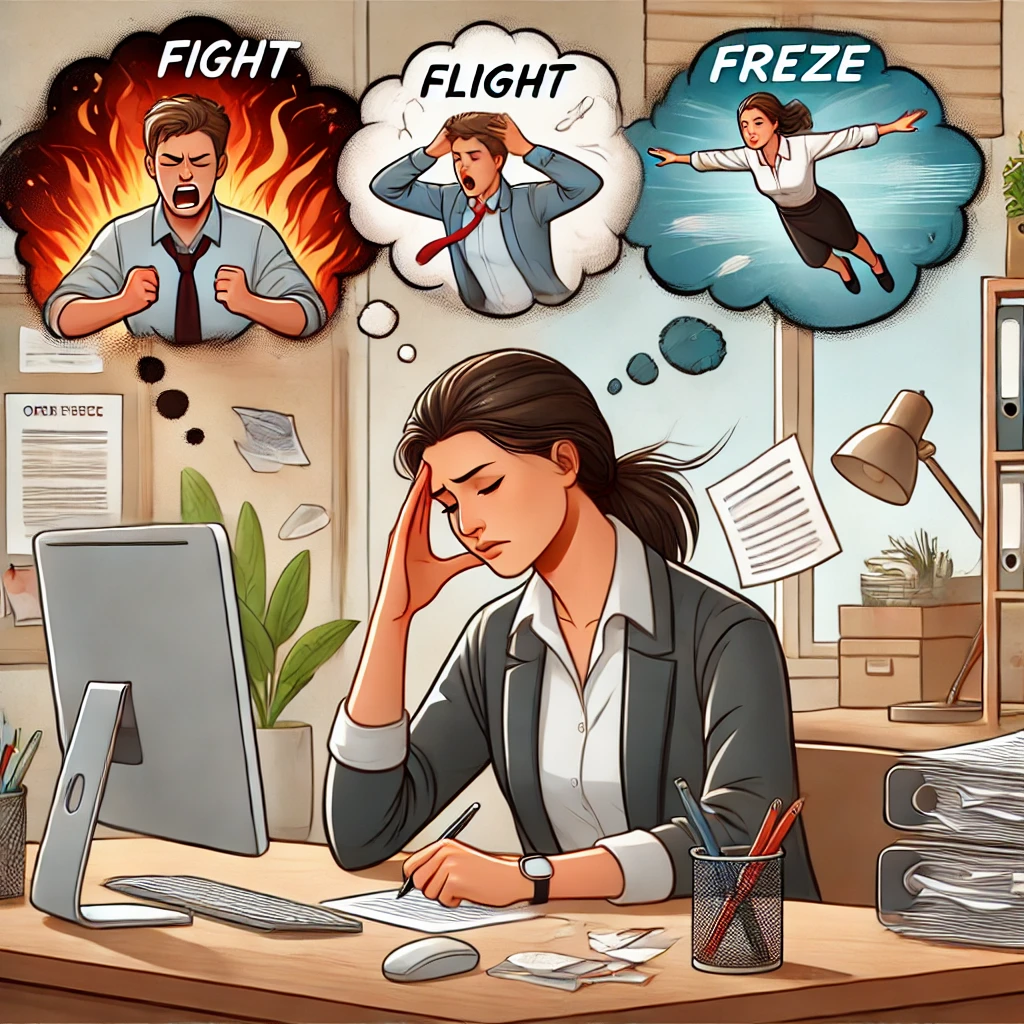ADHD and Workplace Stress: Breaking the Vicious Cycle
Workplace stress can be a relentless cycle for ADHD women.
ADHD makes you more sensitive to stress, and when workplace challenges pile up, they often trigger overload in your brain, making it harder for you to think, do your job well, and stay emotionally regulated.
In my therapy practice here in Charlotte, I see how the wrong fit between my clients and their stressful work environment is catastrophic for their happiness and mental health.
How ADHD and Workplace Stress Interact
For women with ADHD, stress doesn’t just create pressure—it often makes it hard for their brains to work effectively. Let’s break down how this interaction plays out:
- Decreased ability to use complex thinking: Stress can make it harder to focus, make choices, and problem-solve.
- Heightened Impulsivity: Stress can trigger impulsive reactions, such as sending rushed emails or making poor decisions.
- Worsened Executive Functioning: ADHD makes planning, organizing, and managing time harder. Stress worsens these executive functions, leading to missed deadlines, lost paperwork, and disorganization.
- Emotional Dysregulation: Stress makes controlling irritability, frustration, or anxiety harder. You may feel like you're on the verge of an emotional meltdown, which can impact your work relationships.
- Reduced Self-Esteem: Combining all these challenges can lead to feelings of imposter syndrome, inadequacy, and self-doubt. When you’re struggling to keep up, it’s easy to internalize those struggles as a failure, adding more stress.
- Stress can activate the body's natural 'fight, flight, or freeze' response, causing you to either react impulsively, avoid tasks altogether, or feel completely stuck and unable to take action.
The Vicious Feedback Loop
ADHD and stress often create a self-perpetuating feedback loop. The more stress you experience, the harder it becomes to do good work, —leading to more stress. This loop can significantly affect your productivity and emotional well-being, leaving you stuck, exhausted, and unsure of how to move forward.
Common Workplace Stressors for ADHD Women
Specific work environments or dynamics can intensify the challenges ADHD women face. Identifying these stressors can help minimize their impact or seek a better workplace fit. Here are some common workplace triggers:
Job Mismatch
- It can feel draining if your role doesn’t match your strengths. ADHD women often struggle with tasks that require sustained focus, repetitive work, or too much sensory stimulation. The current corporate world usually includes multiple pings, endless meetings, and long hours which tax the adhd brain. Finding work that aligns with your strengths and keeps you engaged is the key to reducing stress.
Unsupportive Supervisors
- Working for a boss who micromanages, criticizes, or fails to offer support can quickly lead to overwhelm. ADHD women benefit from supervisors who provide understanding and constructive guidance instead of constant pressure. Think of a supportive little league coach as a person who embodies the perfect supervisor for an ADHD woman.
Executive Functioning Struggles
- Paperwork-heavy work environments often prove challenging for ADHD women. Tasks such as time management, organization, and handling extensive paperwork can create significant stress, particularly in high-pressure settings. Overcommitting, forgetting deadlines, or underestimating the time needed to complete projects are common struggles. Workplaces that rely heavily on paperwork, documentation, and administrative tasks tend to exacerbate these challenges, making them less suitable for ADHD individuals who thrive in more dynamic and flexible roles.
Corporate Gaslighting
- Sudden changes in job roles, increased expectations, or company restructuring can significantly heighten stress for ADHD women. A typical example is when layoffs occur, and you're suddenly expected to take on the workload of others—adding pressure and overwhelm that can be incredibly challenging to manage with ADHD. A lack of clear direction or shifting job roles may feel overwhelming and lead to burnout.
Not Meeting Personal Standards and Perfectionism
- ADHD women often set high expectations for themselves. If you feel you’re not meeting your potential or living up to your own standards, this can trigger self-criticism and add to your stress.
Sensitivity to Criticism or Failure
- Negative feedback or failure at work can feel much more personal for ADHD women. Even minor criticisms can trigger feelings of inadequacy or rejection sensitivity, leading to stress that lingers far longer than it should.
Changes in Mood or Environment
- Negative or unhappy work environments can significantly impact morale. Sudden shifts in workplace atmosphere can feel especially unsettling for ADHD women, who tend to be highly attuned to emotional cues. If you've experienced past trauma or come from complicated family dynamics, these changes in mood or tension at work may feel even more stressful, triggering heightened anxiety or discomfort.
Breaking the Cycle: How ADHD Can Be a Strength
While ADHD and stress can feel overwhelming, it’s important to remember that ADHD isn’t just a challenge—it can also be a source of strength. Here’s how you can use your ADHD traits to your advantage while building strategies to manage workplace stress:
1. Recognize ADHD as a Strength
ADHD can offer valuable traits that many neurotypical people lack. For example, hyperfocus—when you get locked into a task and lose track of time—can be a superpower when used for the right projects. Many women with ADHD bring creativity, out-of-the-box thinking, and high energy to their work, helping them excel in dynamic environments.
By reframing how you see your ADHD, you can start to embrace it as a strength rather than a limitation.
2. Seek Understanding and Support
A supportive work environment is essential for managing ADHD and stress. Colleagues and supervisors understanding ADHD can offer kindness, flexibility, or encouragement. Finding a workplace that understands and supports neurodivergence is vital to feeling motivated and valued.
3. Find Jobs That Match Your Strengths
Women with ADHD thrive in roles that match their strengths and interests. Creative, fast-paced, or dynamic work environments can provide the stimulation you need to stay focused, interested and motivated. Many ADHD women also succeed in entrepreneurial roles where they can control their schedules and create a work environment tailored to their strengths.
4. Focus on Self-Awareness and Acceptance
Self-awareness is a powerful tool. By accepting your ADHD and understanding how it affects you, you can develop strategies to cope with specific challenges. For example, if time management is a struggle, you might focus on setting up external reminders or breaking tasks into smaller steps. Identifying your strengths and what you need to support yourself is key to thriving in any work environment.
Finding a Supportive Workplace Fit
It’s important to remember that the problem often isn’t you—it’s the environment. Most workplaces aren’t designed to support neurodivergent needs, which can make work far more stressful than it needs to be. Instead of focusing solely on coping mechanisms to survive in an unsuitable job, the goal should be finding (or creating) a workplace that values and uses your unique strengths.
ADHD women perform best in environments where they feel engaged, supported, and challenged. This aligns with the concept of an “interest-based nervous system,” where your brain performs better when you’re interested in the task at hand. You can break the stress-ADHD feedback loop in the right environment and unlock your full potential.
Final Thoughts: Thrive by Reclaiming Your Strengths
Breaking the cycle of stress and ADHD starts with recognizing that ADHD is not a weakness, but a different way of thinking. When you build systems that support you, find a workplace that values your strengths, and advocate for what you need, you can thrive in both your career and personal life. The more inclusive workplaces become, the more ADHD women can break free from the stress cycle and achieve their full potential.





